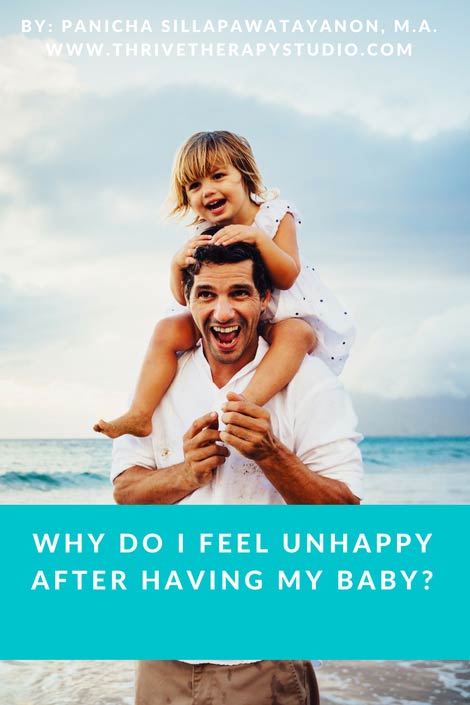Why Do I Feel Unhappy After Having My Baby?

Having a baby can be both exciting and exhausting at the same time. Babies can bring tons of joy, but the transition into parenthood is not easy. You may find yourself feeling worried, irritable, or crying over little things. All of these feelings are normal during the first couple of weeks after childbirth. About 80% of new moms experience what they call “baby blues”.
So what causes baby blues and what can I do?
Baby blues can occur because of the rapid changes your body undergoes after birth. Physically, your hormone levels quickly drop causing mood swings and exhaustion. Emotionally, your baby requires a lot from you and adjusting to a new way of life can be overwhelming.
Baby blues usually go away on their own within 2 weeks, but extra support is always helpful. Sleep deprivation makes baby blues worse, so it’s important to remember to take care of yourself. This is easier said than done with a new baby of course! Don’t be afraid to ask family members or friends for help because even a small nap can make a difference! If you have a partner, lean on them for support. Also, light exercises daily such as walking around the neighborhood have been shown to elevate your mood (don’t forget to check-in with your doctor, especially if you’ve had a C-section).
One of the most common concerns I hear from new moms is the anxiety and worry about being a good mom and the fear that this is all what motherhood will be. Connecting with other new moms is an amazing resource and can provide a level of comfort. Many community agencies and hospitals offer new mom groups oriented towards emotional support for women facing similar experiences.
What if my baby blues lasts longer than 2 weeks?
If your baby blues become more intense and you feel this way for longer than 2 weeks after giving birth, you might be dealing with postpartum depression. The difference between baby blues and postpartum depression is with postpartum depression, these feelings of sadness can be extreme and interfere with the mother’s ability to care for herself or her family. There’s not a single cause for postpartum depression and it doesn’t happen because of something a mother does or doesn’t do. This condition actually affects nearly 15% of all mothers that have given birth regardless of whether it is her firstborn or not. According to the National Institute of Health, some common symptoms of postpartum depression are:
- Feeling sad, hopeless, empty, or overwhelmed
- Crying more often than usual or for no apparent reason
- Worrying or feeling overly anxious
- Feeling moody, irritable, or restless
- Oversleeping, or being unable to sleep even when her baby is asleep
- Having trouble concentrating, remembering details, and making decisions
- Experiencing anger or rage
- Losing interest in activities that are usually enjoyable
- Suffering from physical aches and pains, including frequent headaches, stomach problems, and muscle pain
- Eating too little or too much
- Withdrawing from or avoiding friends and family
- Having trouble bonding or forming an emotional attachment with her baby
- Persistently doubting her ability to care for her baby
- Thinking about harming herself or her baby.
Only a healthcare provider or mental health professional can diagnose and treat postpartum depression. Without treatment, postpartum depression can last for months or years. If you or someone you know is experiencing some of these symptoms, it is important to seek help right away.
At Thrive Therapy Studio, we’re here to help support you and help you heal and we love supporting parents, especially new parents! We are currently offering new mom group therapy as well as individual therapy for postpartum depression, anxiety, and just general parenting or adjustment challenges. Check out our parent group information here.
If you would like to talk with a Thrive Therapist about yourself, your child, or teen attending therapy, please reach out to us by phone at (858) 342-1304.
As always, thanks for reading and comments are always welcome regarding any issues around child or teen psychotherapy services in San Diego by Thrive Therapy Studio.
To stay in the loop on the services offered and to receive updated information about Thrive, please feel free to sign up for the newsletter through the following link: http://eepurl.com/cvGx5n.
Reach out to start
your healing journey

